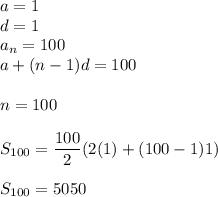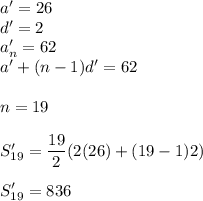
Mathematics, 02.03.2020 16:50 keva1p6dk26
The sum S of the arithmetic sequence a, a + d, a + 2d, . . . , a + (n – 1)d is given by \small S=\frac{n}{2}\left [2a+(n-1)d \right ] . What is the sum of the integers from 1 to 100, inclusive, with the even integers between 25 and 63 omitted?

Answers: 3


Other questions on the subject: Mathematics

Mathematics, 21.06.2019 19:30, Dillpickle3322
Si la base de un triángulo isósceles mide 70 m y el ángulo opuesto a ésta mide 58°; entonces ¿cuánto mide la altura de dicho triángulo? a) 21.87 m. b) 40.01 m. c) 43.74 m. d) 63.14 m.
Answers: 1



Mathematics, 22.06.2019 01:30, cesarcastellan9
Add: (6x^2-5x+3) + (3x^3+7x-8) a. 9x^2+12x-5 b. 9x^2+2x+11 c. 9x^2+2x-5 d. 9x^2-2x+5
Answers: 1
You know the right answer?
The sum S of the arithmetic sequence a, a + d, a + 2d, . . . , a + (n – 1)d is given by \small S=\fr...
Questions in other subjects:


Chemistry, 24.09.2019 08:00



Biology, 24.09.2019 08:00


History, 24.09.2019 08:00











